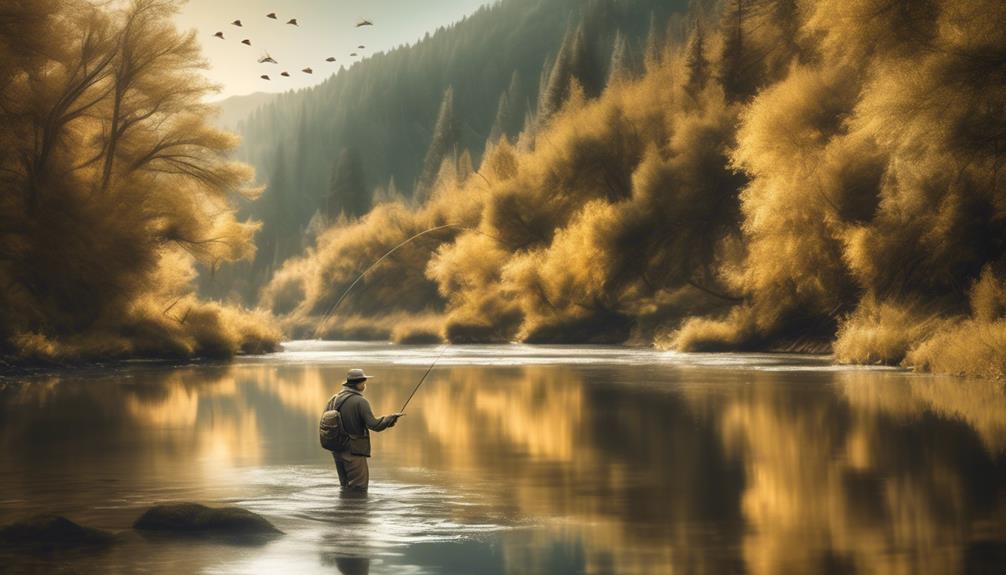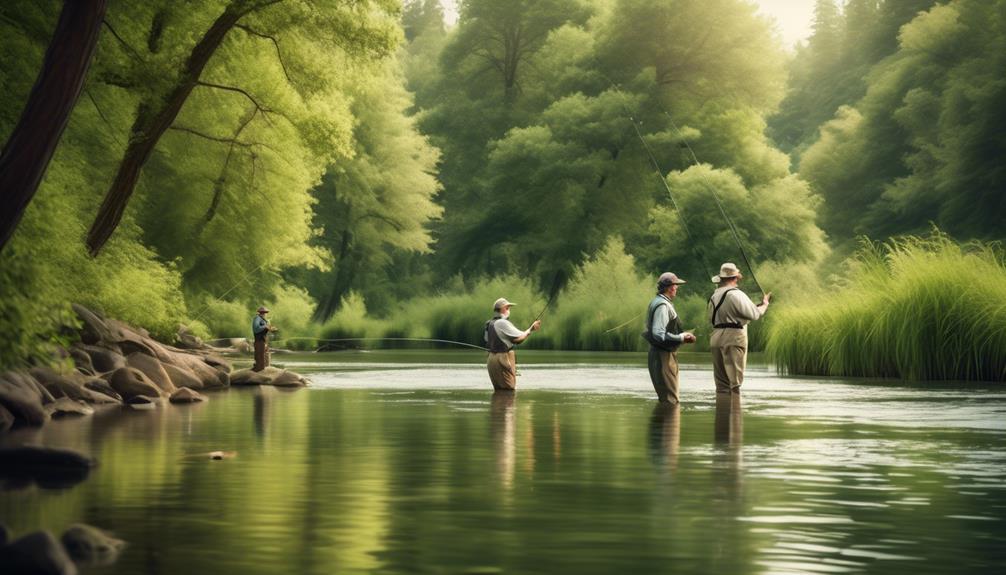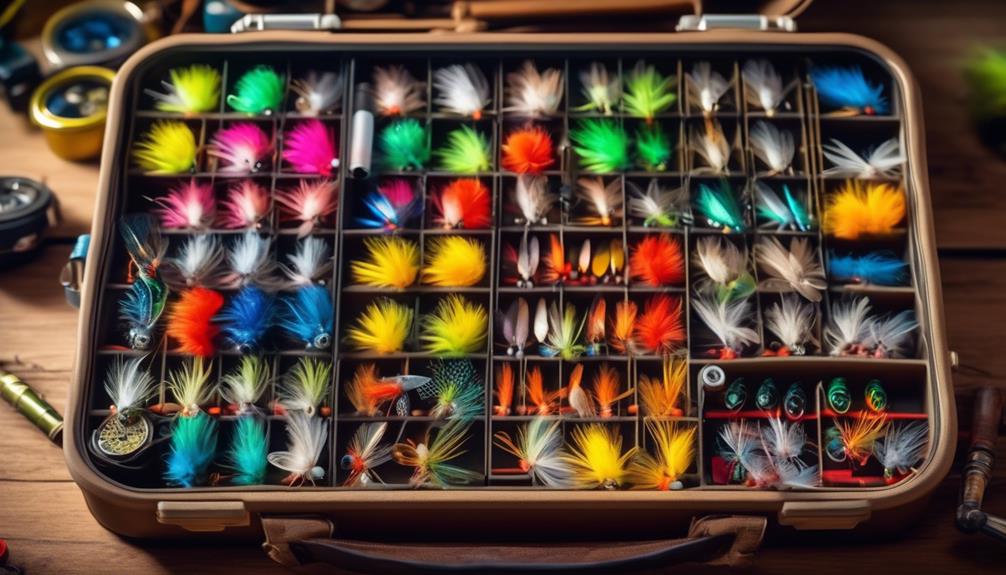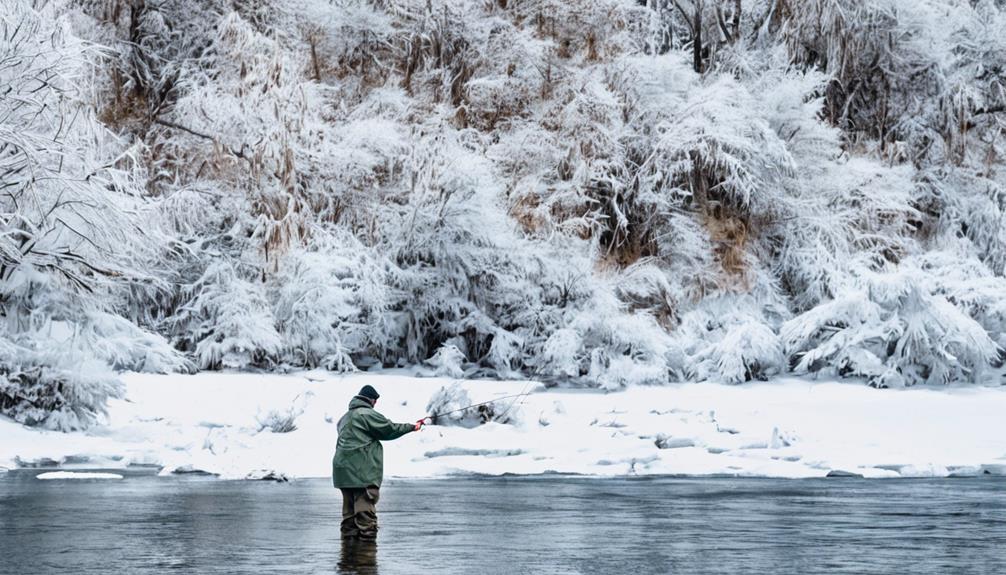When it comes to fly fishing, it's often said that the early bird catches the worm. But in this case, it's not just about being the first one on the water.
Proper fly fishing etiquette can make a huge difference in the overall experience for both you and your fellow anglers. Whether you're a seasoned fly fisher or just starting out, mastering the art of etiquette on the water is crucial.
So, let's explore the 5 best guidelines that will ensure you're not just a skilled fly fisher, but also a respectful and considerate one.
Choosing the Right Fishing Spot
When selecting a fishing spot, consider the accessibility and environmental conditions to optimize your chances of a successful fly fishing experience.
Proper spot selection is crucial when it comes to fly fishing etiquette. It's important to be courteous and respectful of others when choosing a fishing location. Always remember that the best fishing spots are often limited and in high demand. Therefore, it's essential to exercise courtesy and respect for other anglers when selecting a spot.
When you arrive at a fishing location, take a moment to observe the area. Look for signs of other anglers, such as fishing lines in the water or personal belongings left on the shore. If you notice these signs, it's best to move on and find another spot to avoid encroaching on someone else's fishing space.
Additionally, if you arrive at a popular fishing location and find it already occupied, don't crowd the area. Instead, give other anglers space and find a different spot to fish.
Furthermore, when selecting a fishing spot, be mindful of the environmental conditions. Avoid damaging fragile ecosystems by trampling on vegetation or disturbing wildlife. Choose spots that are easily accessible without causing harm to the surrounding environment. By being considerate of the environment and other anglers, you contribute to a positive and respectful fishing community.
Always keep in mind that proper spot selection isn't only about finding the best fishing spot for yourself but also about showing courtesy and respect to others.
Respecting Other Anglers' Space
Respect other anglers' space by maintaining a reasonable distance and refraining from encroaching on their fishing area. Fishing etiquette dictates that you should be mindful of personal space when fly fishing. When you spot another angler fishing in a particular area, avoid setting up too close to them. It's essential to give them enough room to cast their line comfortably without feeling crowded.
Being considerate of other anglers' personal space also involves being aware of your movements and noise level. While fishing, try to move quietly and avoid making loud disturbances that could disrupt others nearby. This includes keeping conversations at a reasonable volume and minimizing any unnecessary noise that could startle nearby fish or disturb fellow anglers.
If you need to pass by another angler to access a different area or return to your starting point, do so carefully and respectfully. Give them the space they need to continue fishing uninterrupted. Additionally, if you accidentally cast your line too close to another angler, politely apologize and ensure that it doesn't happen again.
Properly Handling and Releasing Fish
Being mindful of your fellow anglers' space, it's important to handle and release fish properly to ensure their well-being and conservation. When practicing catch and release, proper fish handling is crucial for their survival.
Always wet your hands before touching the fish to protect their delicate skin and scales. Avoid squeezing the fish or touching their gills, as this can cause harm. Keep the fish in the water as much as possible while removing the hook, and support its body properly to minimize stress.
A fish that's exhausted from a long fight will need more time to recover, so hold it in the water facing upstream until it swims out of your grasp on its own. Using barbless hooks can make it easier to release the fish without causing unnecessary injury. If the fish is hooked deeply, it's better to cut the line close to the hook rather than trying to remove it, as this can cause significant harm.
When releasing the fish, gently hold it in the water, allowing it to regain its strength before swimming away. Never toss the fish back into the water or let it go before it's ready. By handling and releasing fish with care, you contribute to the conservation of fish populations and the enjoyment of future anglers.
Using Proper Casting Techniques
To improve your fly fishing skills and increase your chances of success, practice using proper casting techniques regularly. Improving accuracy is essential for effectively reaching your target areas. Start by mastering the basic overhead cast, which involves smoothly accelerating the rod tip to a stop and allowing the line to roll out in front of you. When executing this cast, focus on the timing and power of your movements to achieve the desired distance and precision. Additionally, incorporating a haul into your casts can help increase line speed and improve accuracy, especially in windy conditions.
To avoid tangles and ensure a smooth casting experience, it's crucial to maintain proper tension on the line throughout the casting process. Keep your loops tight and controlled to prevent the line from crossing over itself and causing frustrating knots. Using the correct amount of power in your casts is also key to avoiding tangles, as excessive force can lead to the line collapsing and tangling mid-air.
Furthermore, consider the position of your fly rod and the angle of your cast to minimize the likelihood of tangles. By keeping the rod tip tracking in a straight line, you can achieve a more efficient and tangle-free cast. With consistent practice and attention to detail, you can significantly enhance your casting techniques, resulting in improved accuracy and fewer frustrating tangles during your fly fishing adventures.
Communicating With Other Anglers
When fishing alongside other anglers, it's important to maintain open communication to ensure a positive and respectful fishing experience for everyone involved. Sharing tips and information with fellow anglers can enhance the overall fishing experience. If you notice something that might help others, don't hesitate to share it in a friendly and non-intrusive manner. Similarly, if another angler offers you advice, be open to receiving it, as they may have valuable insights to share.
Avoiding conflicts is crucial in maintaining a harmonious fishing environment. If you find yourself in a disagreement with another angler, approach the situation with calm and respect. Clear and polite communication can often resolve misunderstandings before they escalate.
Additionally, be mindful of your casting distance and the space you occupy. When fishing in close proximity to others, it's important to be aware of your surroundings and avoid encroaching on someone else's fishing spot.
Keeping the Environment Clean
Ensure you properly dispose of any trash or waste materials to help maintain the cleanliness of the fishing environment for yourself and others. Litter prevention is crucial in preserving the natural beauty of the waters and the surrounding area. When fishing, be mindful of your waste and make use of designated trash receptacles or take your trash with you when you leave.
Here are three important reasons to prioritize keeping the environment clean:
- Environmental Impact: Littering can have detrimental effects on the ecosystem. Plastics and other non-biodegradable materials can harm aquatic life and disrupt the balance of the environment. By properly disposing of your waste, you contribute to the overall health of the ecosystem and ensure a sustainable habitat for the fish you seek to catch.
- Conservation Efforts: Clean surroundings are essential for conservation efforts and wildlife preservation. Your commitment to maintaining a clean environment while fly fishing supports the sustainability of natural resources and helps protect the delicate balance of the ecosystem. As anglers, it's our responsibility to minimize our impact on the environment and actively participate in conservation efforts.
- Respect for Nature: Keeping the environment clean demonstrates respect for the natural world and for other anglers who'll enjoy the same fishing spots in the future. It's essential to leave the environment as pristine as you found it, ensuring that future generations can also experience the joy of fly fishing in unspoiled surroundings.
Following Local Fishing Regulations
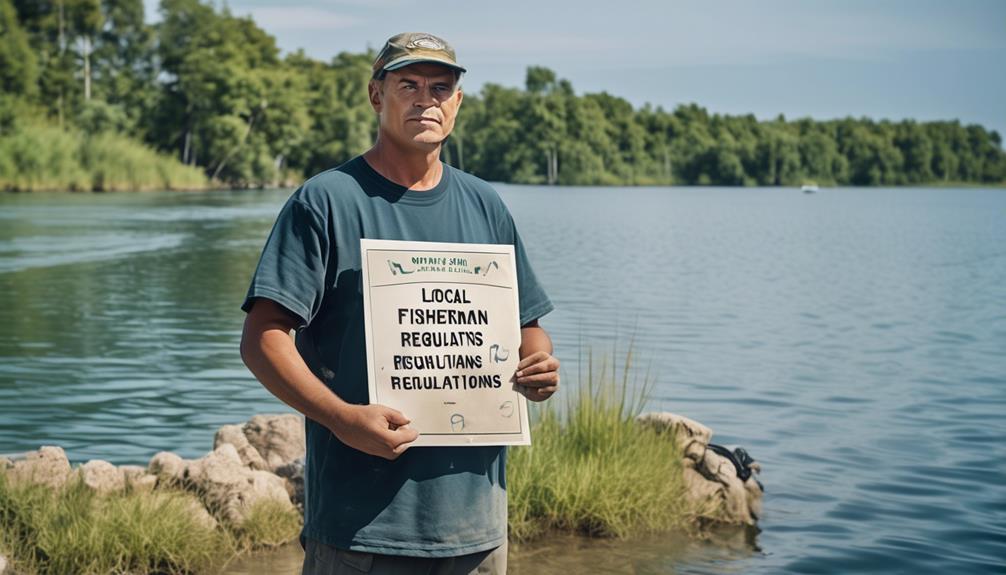
Adhere to local fishing regulations to promote ethical angling practices and protect the sustainability of fish populations and their habitats. Understanding catch limits is crucial for ensuring the conservation of fish stocks. These limits are set by local authorities to prevent overfishing and maintain healthy fish populations. By adhering to catch limits, you contribute to the preservation of the aquatic ecosystem and ensure that future generations can also enjoy the sport of fly fishing.
Environmental impact is another critical aspect of following local fishing regulations. Regulations may include guidelines on the types of bait and tackle allowed, as well as restrictions on fishing in certain areas to protect sensitive habitats. By respecting these regulations, you help minimize the disturbance to aquatic ecosystems, preserving the natural balance of the environment.
Furthermore, following local fishing regulations demonstrates respect for the local community and its resources. It shows consideration for the livelihoods of those who depend on sustainable fishing practices for their income. By obeying these regulations, you contribute to the overall well-being of the community and support responsible and sustainable angling practices.
Being Courteous and Considerate
Respecting local fishing regulations not only safeguards the sustainability of fish populations but also sets the foundation for being courteous and considerate while fly fishing. When it comes to being courteous and considerate on the water, here are a few essential guidelines to keep in mind:
- Showing Respect: It's crucial to show respect not only to fellow anglers but also to the environment around you. Be mindful of other anglers' space and avoid crowding or casting over someone else's fishing spot. Additionally, always clean up after yourself and avoid leaving any trash or debris behind. Respecting the natural surroundings and wildlife demonstrates your appreciation for the ecosystem and enhances the overall fly fishing experience for everyone.
- Practicing Patience: Patience is a virtue, especially in fly fishing. Whether you're waiting for the perfect opportunity to cast your line or patiently untangling a snag, practicing patience is key to maintaining a harmonious environment on the water. Avoid displaying frustration or impatience, as it can disrupt the tranquility of the fishing experience for others. By remaining patient and composed, you contribute to a more enjoyable and respectful atmosphere for all anglers.
- Offering Assistance: Being courteous and considerate also means being willing to lend a helping hand when needed. Whether it's offering tips to a beginner angler or assisting someone with untangling their line, small acts of kindness can go a long way in fostering a positive and supportive fly fishing community. By being open to assisting others, you contribute to a culture of camaraderie and mutual respect among fellow anglers.
Frequently Asked Questions
Can I Bring My Own Music to Play While I Fish?
You can bring your own music to play while you fish, but be mindful of disturbing others. Keep the volume low and considerate of neighboring anglers. Everyone has different noise preferences, so respect the peaceful fishing atmosphere.
How Should I Handle Encountering Wildlife While Fly Fishing?
When encountering wildlife while fly fishing, respect their space and observe from a distance. Avoid sudden movements and loud noises. If you want to take photos, use a zoom lens to avoid disturbing them. Wildlife conservation is important.
Is It Okay to Bring My Dog With Me While I Fly Fish?
Bringing your dog while fly fishing can be distracting to others and wildlife. It's best to leave pets at home to ensure a peaceful and respectful fishing experience for all. Follow proper fly fishing etiquette.
What Should I Do if I Accidentally Hook Another Angler's Line?
If you accidentally hook another angler's line, apologize gracefully and respect their boundaries. Communicate calmly and work together to resolve the situation. Offer to help fix any damage and make sure to be more cautious in the future.
Are There Any Specific Etiquette Rules for Fly Fishing in a Crowded Area?
When fly fishing in a crowded area, be mindful of navigating space and respecting boundaries. It's important to give other anglers enough room to cast their lines and avoid crowding or interfering with their fishing spots.
Conclusion
So, next time you head out for a day of fly fishing, remember to follow these guidelines for proper etiquette.
- Choose the right fishing spot
- Respect others' space
- Handle fish properly
- Use correct casting techniques
- Communicate with fellow anglers
- Keep the environment clean
- Follow local regulations
- Be courteous
By following these guidelines, you'll ensure a positive and enjoyable experience for everyone on the water.
Happy fishing!
